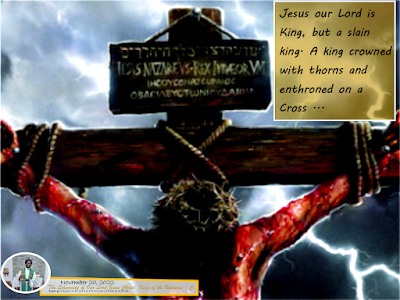THE SLAIN KING.
November 20, 2022.
The Solemnity of Our Lord Jesus Christ, King of the Universe
- C.
“How worthy is the Lamb who was slain, to receive power and
divinity, and wisdom and strength and honor. To him belong glory and power
forever and ever." Revelation 5:12.1.6 "This is the King of the
Jews." Lk 23:37
A Portuguese proverb says: “As the king lives, so live his
vassals.” And a Spanish proverb adds: “As is the king, so are his people.”
While celebrating the Solemnity of Christ the King, the
readings and the whole liturgy, starting with the Entrance Antiphon orient our
thoughts and meditation on the reality of the Cross, the place where Jesus'
true identity was revealed and where his kingship was made manifest. Jesus our
Lord is King, but a slain king. A king crowned with thorns and enthroned on a
Cross.
About the Lord's kingship, the Church says: “Though already
present in his Church, Christ's reign is nevertheless yet to be fulfilled
"with power and great glory" by the King's return to earth. This
reign is still under attack by the evil powers, even though they have been
defeated definitively by Christ's Passover. Until everything is subject to him,
"until there be realized new heavens and a new earth in which justice
dwells, the pilgrim Church, in her sacraments and institutions, which belong to
this present age, carries the mark of this world which will pass, and she
herself takes her place among the creatures which groan and travail yet and
await the revelation of the sons of God." That is why Christians pray,
above all in the Eucharist, to hasten Christ's return by saying to him:559
Maranatha! "Our Lord, come!"” CCC 671.
The Solemnity of Our Lord Jesus Christ, King of the Universe
marks the end of the year of the Church, the Liturgical Year. By next week,
through Advent, we will celebrate the coming of a new year. This circle of
celebration, beyond the ritualistic aspects or the routine, teaches us of the
centrality of Christ and his mysteries in our lives. He is the Alpha and the
Omega, the beginning and the end, the one who gives meaning and direction to our
lives.
Coming back to today's liturgy, let's reflect on Jesus'
kingship. The first reading speaks of the Davidic reign. David was anointed as
King of Israel. It is the second and most solemn anointing of David. The first
was a secret and strict private family celebration that took place through the
prophet Samuel (1 Sam 16:1-13) and at God's directives. It was a divine
designation. Today, we read about another anointing, the assembly of Hebron
were all the leaders of Israel chose to make him their king. From this
anointing and public election, David will have a firm and lasting reign.
The Lord Jesus, of Davidic ascendance, is announced at his
birth to be a king. His kingship, however, is of another dimension. Not like
our today's kings. He is a suffering and dying king, and a king who is slain.
Thus, today's Gospel presents where the Lord's Kingship gets its perfect
expression, on the Cross, dying for the redemption of sinners. Three times, in
today's extract, words in relation to Kingship are used. We read that, while
Jesus was hanging on the Cross, the people jeered at him saying: "If you
are the king of the Jews, save yourself." Then Pilate wrote an inscription
stating the motive of his condemnation: "This is the King of the
Jews." And thirdly the words of the repentant thief: "remember me
when you come into your kingdom."
At the Cross, we have the full and perfect revelation of
Jesus. He is truly the King the Jews were awaiting. He is a king who came to
save all. And his kingdom is still to come. It is a kingdom that has already
come and is still to come. To that kingdom, everyone is invited, righteous as
well as sinners. The only thing it requires is sincere repentance in order to
hear him tell us: "Indeed, I promise you, today you will be with me in paradise."
The Apostle Paul, addressing the Colossians, tells us that
the Father has created a place for us in the kingdom of the Son that he loves.
Paul speaks of the Supremacy of the Son of God. The Son of God, our Lord Jesus
Christ is given "Thrones, Dominations, Sovereignties, Powers..." He
reigns over all things, visible and invisible. He is the beginning and the end
of all things. In his precious blood that poured from the Cross, he has won us
reconciliation with God. To lead us to a sound understanding of the Messiah or
Christ, that is the aim Paul sets for himself. The Messiah, our King, and the
King of the Universe is not like the other kings the society and the world
know. He is a king who reigns by dying for his subjects and not a king who
kills his subjects in order to perpetuate his reign.





Comments
Post a Comment